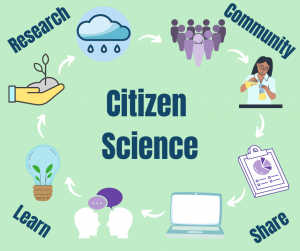 Sitting out in your backyard or park you hear the rustle of animals through the trees, see the decomposition of leaves on the ground, and watch dogs follow the scent of some unknown wildlife. These things may seem mundane and inconsequential but really those observations, if done with scholarly rigor, are science. Scientific observations are an essential component of the scientific method, but you don’t necessarily need a PhD to make those observations. In fact, we’ve seen that for a subset of big data research there is no way for scientists to collect all the data they need for their endeavors on their own. They need the support of the public and this is where citizen science (public participation in scientific research) enters the scene. With proper training, citizen scientists all over the world can participate in research that furthers our knowledge of biology, ecology, the environment and more. Plus, during this time of social distancing, there are many opportunities to volunteer fully online or outdoors with little to no in-person contact.
Sitting out in your backyard or park you hear the rustle of animals through the trees, see the decomposition of leaves on the ground, and watch dogs follow the scent of some unknown wildlife. These things may seem mundane and inconsequential but really those observations, if done with scholarly rigor, are science. Scientific observations are an essential component of the scientific method, but you don’t necessarily need a PhD to make those observations. In fact, we’ve seen that for a subset of big data research there is no way for scientists to collect all the data they need for their endeavors on their own. They need the support of the public and this is where citizen science (public participation in scientific research) enters the scene. With proper training, citizen scientists all over the world can participate in research that furthers our knowledge of biology, ecology, the environment and more. Plus, during this time of social distancing, there are many opportunities to volunteer fully online or outdoors with little to no in-person contact.
We can talk about the individual skills it develops and the usefulness citizen science provides for researchers, but ultimately it is the community-centered aspect that provides its strongest value and impact. As a way to engage in a community that makes the world a better place, citizen science is very appealing. As we continue to face public health, climate, and social justice crises (among others) at the local, national, and global level, we need community-centered solutions that bridge the gap between experts and the public in a responsible and effective way. While open science efforts have paved the way for a more science-conscious public, current events demonstrate the need for better relationships between scientists and the community. Also, these initiatives provide traditionally excluded communities more connections, power, and access in the scientific community. Ultimately, citizen science projects bring the public into the scientific process, facilitate learning by doing, and promote engagement with knowledge, nature, and humanity. Not to mention it feels good to get involved, make a difference, and have fun!
These issues of science literacy, pollution, health, equity, etc. are reflected in our own campus community as well. Citizen science on and off campus can be one piece of the pathway to a more informed, active, and healthy society. In fact, citizen science projects are already contributing to research tackling these complex topics. Increases in community involvement can only improve these efforts and it’s important that they be effectively promoted. In support of this mission, we recently hosted a citizen science workshop and created a citizen science research guide. [Judit Ward wrote a blog post about (among other things) skepticism towards citizen science.] Critical evaluation of all scientific endeavors is essential for progress, including in citizen science, but so is rigorous but playful experimentation. The breaking of boundaries and reimagining of research in the age of open science is crucial. Bringing citizen science to our schools, outdoor spaces, libraries, and homes does have an impact and should be a priority––including participatory research in non-STEM fields. There is a lot that libraries can do to assist in this endeavor. Through workshops, resource gathering, highlighting research, and offering our physical spaces we can provide support for citizen science efforts across campus.
For example, our recent workshop on citizen science was attended by students and faculty alike, with a healthy waitlist––proof that the hunger is out there! We focused on understanding the fundamental concepts of citizen science and helping participants find projects that will align with their needs and passions. Participants split up towards the end in breakout rooms and discussed their past experiences with citizen science, with some faculty members highlighting projects they were already carrying out. At the very end, participants were allowed time to explore existing projects through resources discussed in the workshop. This is one example of the many ways libraries can get involved in citizen science on campus.
If you’re interested in learning more about citizen science check out our resource guide! To get you started here are some quick links to explore.
- Our resource guide: https://libguides.rutgers.edu/citizenscience
- Find a project: https://scistarter.org/
- Read a book: https://bit.ly/3iKgoB2
- Get involved at Rutgers: https://njaes.rutgers.edu/volunteer/
- Solve puzzles for science: https://fold.it/portal/
